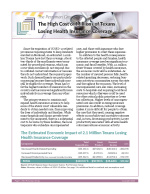The High Cost of Millions of Texans Losing Health Insurance Coverage
Published on April 24, 2024

Since the expiration of COVID-19-related provisions requiring states to keep residents enrolled in Medicaid, an estimated 2.1 million Texans have lost their coverage. Texas has by far the highest number of uninsured in the country and has removed significantly more individuals from coverage than any other state.
The primary reason to maintain and expand health insurance access is to help some of the state's most vulnerable residents to obtain needed care, thus improving the lives of individuals and families. In addition, there are significant economic and fiscal benefits.
With 2.1 million fewer Texans covered by health insurance, health-related spending decreases, reducing business activity in communities across the state and throughout the economy. Uncompensated care also rises, along with insurance premiums. In addition, it becomes more difficult for people to obtain the care that they need, causing negative effects on morbidity and mortality outcomes and, in turn, decreasing productivity. Lower productivity associated with adverse health outcomes reduces economic activity.
We estimated the economic costs of decreasing the number of Texans covered by health insurance by 2.1 million and found that, if the situation persists, the state loses $58.9 billion in annual gross product and almost 509,200 jobs (including multiplier effects). Economic harms are spread across the state. Even worse, millions of people are now finding it harder to get the health care they need.
For more details please refer to the full brief.
- Tags: Medicaid, healthcare, insurance